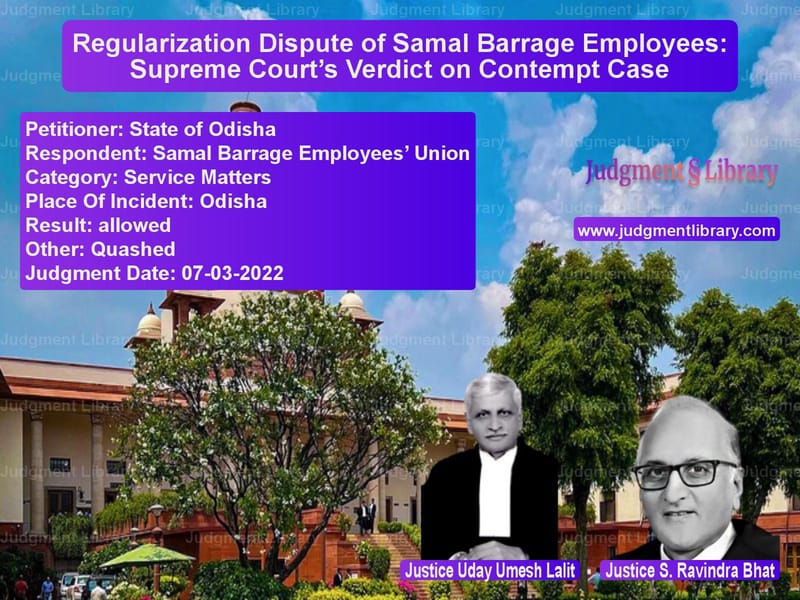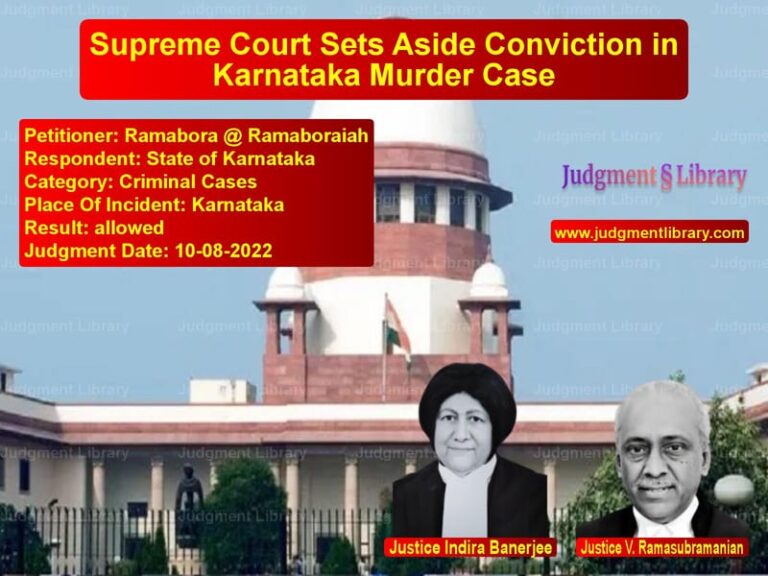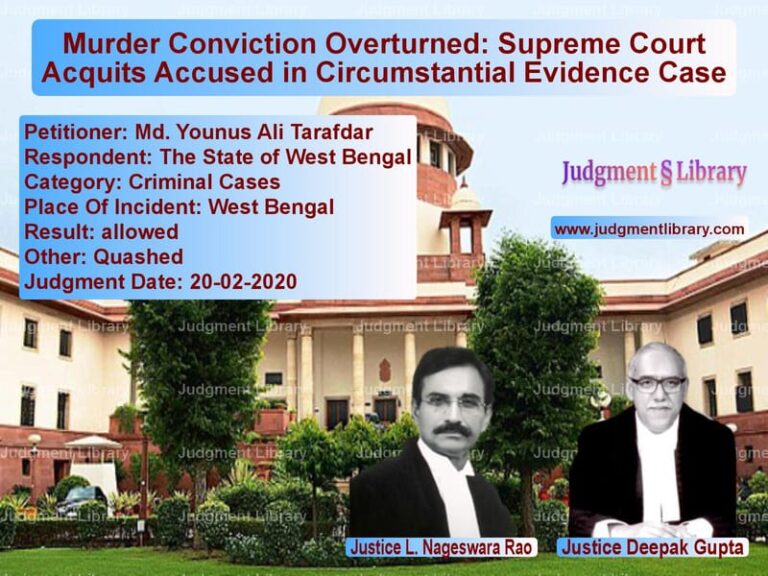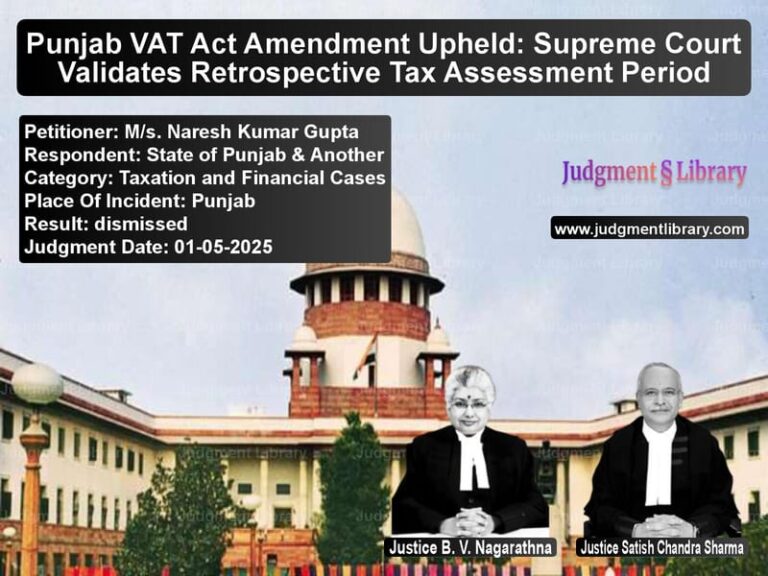Regularization Dispute of Samal Barrage Employees: Supreme Court’s Verdict on Contempt Case
The case of State of Odisha vs. Samal Barrage Employees’ Union revolves around a prolonged legal battle concerning the regularization of employees and the role of contempt proceedings in enforcing judicial orders. This Supreme Court judgment provides a crucial interpretation of procedural fairness and due process in contempt cases, particularly when the original writ petition and subsequent contempt petitions were disposed of without hearing the concerned official respondents.
The dispute pertains to the demand for regularization of employees working at Samal Barrage in Odisha. The case went through multiple writ petitions, contempt petitions, and a final appeal before the Supreme Court, which ultimately set aside the High Court’s order, ruling that the contempt case was improperly adjudicated.
Background of the Case
The case originated from a writ petition (W.P. (C) No. 1954 of 2020) filed by the Samal Barrage Employees’ Union before the Odisha High Court. The petition sought directions for the regularization of employment for certain workers who had been engaged in temporary or contractual capacities for an extended period. The High Court directed the official respondents to examine and decide the regularization request within seven days of receiving the court order.
Following this, another writ petition (W.P. (C) No. 3442 of 2020) was filed with similar demands. The High Court, without issuing notice to the government officials, passed an order directing the state to regularize the employees within one and a half months. However, the state government rejected the claim for regularization.
When the state failed to comply with the court’s directive, multiple contempt petitions were filed, culminating in Contempt Case No. 896 of 2021. The High Court directed the personal appearance of the alleged contemnors and sought an explanation for non-compliance.
Arguments of the Petitioner (State of Odisha)
The State of Odisha, represented by its legal counsel, argued that:
- The original writ petition (W.P. (C) No. 3442 of 2020) and subsequent contempt petitions were disposed of without issuing notice to the government officials, denying them an opportunity to present their case.
- The state government had already considered the employees’ request and rejected it through an order dated 31.12.2020. The rejection was based on legal and administrative grounds.
- The High Court’s order directing regularization was passed in a summary manner without an adequate hearing, making it inappropriate to hold state officials in contempt for not following an order that was never properly adjudicated.
- The principles of natural justice were violated because the officials were not given a fair chance to contest the claims before being held liable for contempt.
Arguments of the Respondent (Samal Barrage Employees’ Union)
The employees’ union countered these claims by stating:
- The state had willfully disobeyed the High Court’s direction, and its inaction was a clear case of contempt.
- The state was well aware of the ongoing litigation and had ample time to respond, yet it chose to ignore the judicial orders.
- Even if procedural irregularities existed, the state should have approached the High Court earlier instead of outrightly rejecting the regularization request.
- The employees had served for years in precarious employment conditions, and the state had a duty to regularize their services in line with judicial precedents on unfair labor practices.
Supreme Court’s Observations
The Supreme Court, comprising Justices Uday Umesh Lalit and S. Ravindra Bhat, meticulously examined the procedural history of the case and noted several irregularities in the High Court’s handling of the matter.
The Court made the following key observations:
- Violation of Natural Justice: The Supreme Court found that the original writ petition and subsequent contempt proceedings were disposed of without issuing notices to the state authorities. This procedural lapse deprived the state of its right to a fair hearing.
- Improper Contempt Proceedings: The High Court had not considered the fact that the government had already passed an order rejecting the regularization claim. Since there was no binding order requiring the state to approve regularization, holding officials in contempt was legally flawed.
- Role of Contempt Proceedings: The Supreme Court reiterated that contempt proceedings should not be used as a substitute for executing a judgment, particularly when the judgment itself is ambiguous or improperly adjudicated.
- Right to Challenge Rejection: The Court clarified that the employees’ union still had the right to challenge the state’s rejection order through proper legal channels rather than pursuing contempt proceedings.
Supreme Court’s Judgment
Based on these observations, the Supreme Court ruled as follows:
- The appeal by the State of Odisha was allowed, and the order dated 01.03.2021 passed by the High Court in Contempt Case No. 896 of 2021 was set aside.
- The contempt proceedings against state officials were dismissed as there was no deliberate violation of a court order.
- The employees’ union was granted the liberty to challenge the state’s rejection order dated 31.12.2020 through appropriate legal channels, such as a fresh writ petition.
- The Special Leave Petitions related to the earlier contempt orders were also disposed of, given the Court’s ruling on the main contempt case.
The Court concluded by emphasizing:
“It shall be open to the respondent Union to challenge the order dated 31.12.2020, if so advised. In case any such challenge is raised, the same shall be considered purely on its own merits without being influenced by any of the observations made by the High Court in the proceedings indicated hereinabove.”
Conclusion
This ruling underscores the importance of procedural fairness in judicial proceedings, particularly in contempt cases. The Supreme Court’s decision establishes that contempt proceedings cannot be initiated without ensuring that all parties have had a fair opportunity to be heard. The judgment also reaffirms that administrative decisions, such as regularization requests, must be challenged through proper legal channels rather than enforced through contempt petitions.
The case highlights the delicate balance between judicial intervention in labor matters and the necessity of following due process when holding government authorities accountable.
Petitioner Name: State of Odisha.Respondent Name: Samal Barrage Employees’ Union.Judgment By: Justice Uday Umesh Lalit, Justice S. Ravindra Bhat.Place Of Incident: Odisha.Judgment Date: 07-03-2022.
Don’t miss out on the full details! Download the complete judgment in PDF format below and gain valuable insights instantly!
Download Judgment: state-of-odisha-vs-samal-barrage-employ-supreme-court-of-india-judgment-dated-07-03-2022.pdf
Directly Download Judgment: Directly download this Judgment
See all petitions in Employment Disputes
See all petitions in Disciplinary Proceedings
See all petitions in Public Sector Employees
See all petitions in Termination Cases
See all petitions in Recruitment Policies
See all petitions in Judgment by Uday Umesh Lalit
See all petitions in Judgment by S Ravindra Bhat
See all petitions in allowed
See all petitions in Quashed
See all petitions in supreme court of India judgments March 2022
See all petitions in 2022 judgments
See all posts in Service Matters Category
See all allowed petitions in Service Matters Category
See all Dismissed petitions in Service Matters Category
See all partially allowed petitions in Service Matters Category







